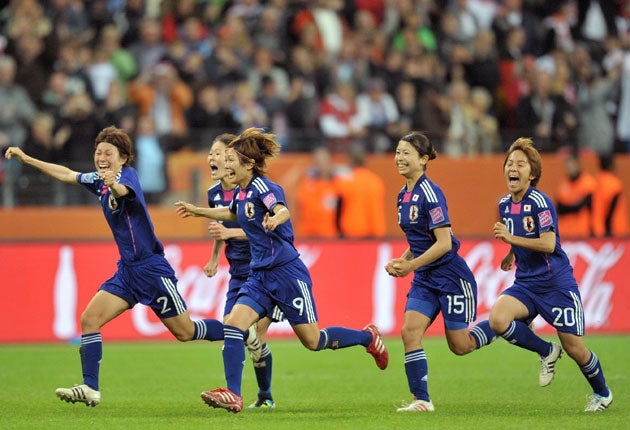From nuclear disaster to World Cup triumph
Two of the stars of Japan's victory used to work at Fukushima. David McNeill reports on the women who have inspired a nation

Among the proudest supporters of Japan's fairytale World Cup victory against the US women's team were thousands of workers at the crippled Fukushima nuclear power plant. And for good reason: two of their former colleagues play for the national team.
The star of Japan's women's outfit may have been captain Homare Sawa, who sealed her rightful place as perhaps Asia's greatest female player with a last-minute 2-2 equaliser in Sunday's final in Frankfurt. But the tournament's most remarkable stories surely belong to Aya Sameshima and Karina Maruyama.
Maruyama, a midfielder, and Sameshima, a defender, worked at the Daiichi nuclear plant before the 11 March earthquake and tsunami that led to the world's worst nuclear crisis since Chernobyl in 1986. Both have friends still involved in the dangerous fight to clean up the disaster.
Among the more unorthodox dressing room tactics employed by Japan's coach, Norio Sasaki, were video screenings of post-meltdown Fukushima, a strategy designed to motivate the team's players. It seems to have worked: after an emotional group screening before the game against home favourites Germany last week, Maruyama went out and knocked in the giant-killing winning goal deep into extra time.
Like many Japanese, Atsushi Watanabe watched that stunning victory in tears. Unlike most, however, he knew her as a Fukushima veteran. "That's when the media started talking about her background as a plant worker, but we had been following her since the start," said Mr Watanabe, a maintenance worker who has been braving dangerously high radioactivity at the Fukushima complex since he was asked to go back to help shut it down in April. "We feel like she's one of us."
By day, Sameshima and Maruyama worked in the offices of the power plant, operated by Tokyo Electric Power Co (Tepco), and in the evenings trained with the company sponsored team, Tepco Mareeze. Among the many once unthinkable developments since 11 March has been the transformation of their former training ground into a base camp for the fight against the nuclear disaster. Instead of athletes, men in radiation suits and masks now file through the village daily on their way to and from the plant, the sort of post-apocalyptic scenario often rehearsed in manga comics.
The tale of Sameshima and Maruyama capped a victory almost too good to be true: an underdog team playing against a far superior opposition for a country struggling to recover from one of its worst natural disasters. Japan's team had lost to the United States in 25 previous encounters and its diminutive, wiry athletes were dwarfed by their opponents. The team's nickname, Nadeshiko, a sturdy pink flower, came to symbolise its players' graceful, unexpected resilience.
Few Japanese even knew the women's team had gone to Frankfurt and almost nobody expected them to win. It took Maruyama's goal against Germany to awaken the nation to the highly-charged drama inside the Japanese dressing room.
Coach Sasaki admitted that the contest had become more than about simply what happened on the field. "Usually I'm talking to the players just about soccer," he told the US cable network ESPN. "But after the disaster sometimes I also talked to them about playing for [the people of Japan], to encourage them."
Maruyama also admitted to a Japanese newspaper that she burst into tears after reading a message from a Fukushima plant worker who said her victory had "renewed our will to work and fight together". One reason for her tears, Watanabe said, was relief. "I think some of us feared that instead of being a hero she would be bashed because of her association with the plant. There is so much anger right now at what happened in Fukushima."
Sameshima too acknowledged that the tragedy back home was never far from her mind. "I want to play well for the people of Fukushima and for my team-mates who cannot play soccer [anymore]," she told ESPN. "I want to play from my heart."
That fighting spirit, and the sense that the World Cup had taken on a significance for Japan that the Americans couldn't imagine, arguably gave the smaller, weaker side the edge and lent the game an emotional, almost mythic edge. Around Tokyo, thousands crammed into bars to watch the kick-off at 3:45am, cheering wildly when Sawa scored following a corner kick two minutes from the end and forcing the game into extra time.
When Japan won on penalties, Jun Taito went wild. "It's a turning point," said the 30-year-old salaryman. "We needed something to bring us back to our feet and got it from these amazing women. They have showed us how."
"It's just so uplifting," agreed a woman who said she would spend yesterday – a national holiday – celebrating. "Of course it's only a game but they played their hearts out and somehow we lifted them up. We lifted each other up, and it's sweeter because they're women."
In Frankfurt, their joy was matched by Sawa's. "I can't believe it," said the five-time World Cup finals veteran said. "We won because we never stopped fighting until the end." Later she told Japanese reporters that the team had a simple motto: Never give up. "We thought, maybe if we play harder we can send that message to the people affected by the disaster. That's how to survive – never give up."
Subscribe to Independent Premium to bookmark this article
Want to bookmark your favourite articles and stories to read or reference later? Start your Independent Premium subscription today.

Join our commenting forum
Join thought-provoking conversations, follow other Independent readers and see their replies